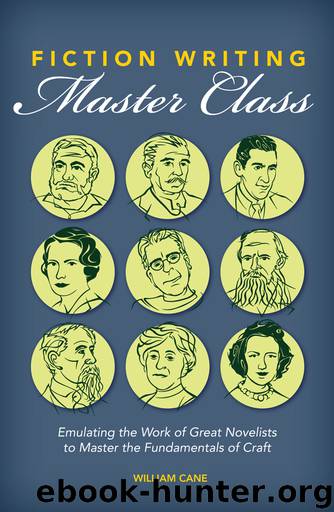Fiction Writing Master Class by William Cane

Author:William Cane
Language: eng
Format: epub
Publisher: F+W Media
There’s no rule saying you shouldn’t ever use these words, but being aware that they can lead to subordination can help you spot problems that are easily fixed with a little Hemingwayesque rewriting.
THE LOOK OF YOUR PAGES
How often do you step back from your work and look at the pages you’re writing? I mean actually look at them from a distance. “What good is that?” you say. “I wouldn’t be able to read the words!” That’s precisely the point. When you’re far away you don’t see the words, all you have is a sense of how the pages look—something that’s actually more important than you might think.
One of Hemingway’s little-known tricks of the trade was to be aware of the appearance of his pages. He didn’t like fat paragraphs. Instead he relied heavily on dialogue, especially short lines of dialogue between two characters. This technique is actually more than two thousand years old and was invented by the ancient Greek dramatists, who called it stichomythia, literally short lines of poetry or dialogue. You’ll find plenty of stichomythia in Euripides, Sophocles, Aristophanes, and other ancient Greek dramatists. Here’s an example from Aeschylus’ The Choephori.
Clytemnestra: So, you plan to murder your own mother?
Orestes: You are the one murdering yourself.
Clytemnestra: Beware the fury of a mother’s curse.
Orestes: What of my father’s fury if I don’t avenge him?
Clytemnestra: I gave birth to a snake not a son.
Download
This site does not store any files on its server. We only index and link to content provided by other sites. Please contact the content providers to delete copyright contents if any and email us, we'll remove relevant links or contents immediately.
Graduate Admissions Essays, Fourth Edition: Write Your Way into the Graduate School of Your Choice (Graduate Admissions Essays: Write Your Way Into the) by Asher Donald(2922)
Writing for the Web: Creating Compelling Web Content Using Words, Pictures and Sound (Eva Spring's Library) by Lynda Felder(2352)
The Emotion Thesaurus: A Writer's Guide to Character Expression by Puglisi Becca & Ackerman Angela(2144)
On Writing: A Memoir of the Craft by Stephen King(1772)
On Writing by Stephen King(1435)
Letters to a Young Writer by Colum McCann(1310)
Seven Steps to Confident Writing by Alan Gelb(1111)
The Wretched of the Earth by Frantz Fanon(1067)
4 3 2 1 by Paul Auster(1055)
Letters to a Young Poet by Rainer Maria Rilke(1035)
Dart by Alice Oswald(995)
Writing Down The Bones: Freeing The Writer Within by Natalie Goldberg(980)
The Vindications by Mary Wollstonecraft(955)
Words Fail Me by Patricia T. O'Conner(916)
Rules for Writers by Diana Hacker & Nancy Sommers(911)
The Sound of Paper by Julia Cameron(837)
Consider the Lobster: And Other Essays by David Foster Wallace(814)
Double Indemnity by James M. Cain(763)
Save the Cat! by Blake Snyder(762)
